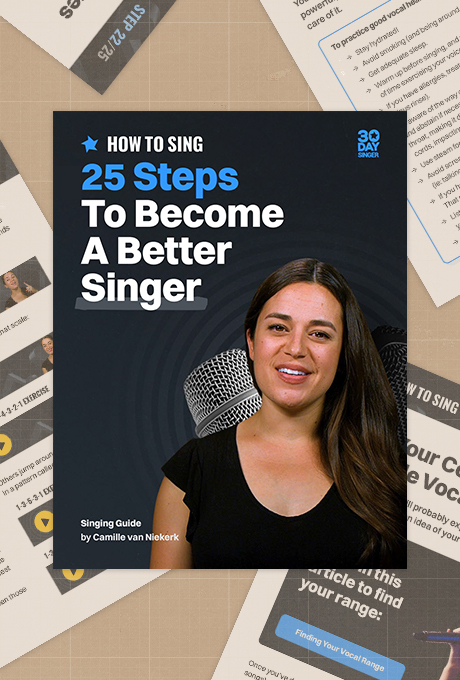Larynx Function
May 3, 2022
“Larynx Function”
Camille van Niekerk
Learn about the function of the larynx, and its role in singing.
What is the larynx?
The larynx is part of your respiratory system. It is a hollow tube, approximately 2 inches long, that lets air pass from your throat to your trachea on the way to your lungs. Because it houses and protects your vocal folds (vocal cords), sometimes it’s referred to as the voice box.
What is it made of?
The larynx is made of cartilage, ligament, membrane and muscle.
Where is it?
It is located in the middle of your neck. The “Adam’s apple”, or laryngeal prominence, is the bump formed by your thyroid cartilage, which is part of the larynx. Although it’s more prominent in men (due to larger larynx size), most women can find their laryngeal prominence by gently running a finger from their chin down their throat and feeling for a “bump”.
Another easy way to identify the larynx is by placing a few fingertips gently on the front of your throat and swallowing. Your larynx raises and lowers when you swallow. You can also yawn and feel your larynx lower.
What does it do?
The larynx serves as a passageway for air from your pharynx (top of your throat, behind your mouth) through your trachea, to your lungs. It prevents food and other particles from entering your trachea (and lungs). If you’ve ever coughed after drinking or eating something that “went down the wrong pipe”, you’ve experienced this function of the larynx! It also houses and protects your vocal folds (or vocal cords).
How does it impact my singing?
Although you don’t have direct, conscious control over the larynx, your indirect control over the muscles of the larynx are how you make any sound at all! All speaking and singing is made possible by the vibration of the vocal folds within the larynx.
The height of the larynx also has a large impact on your tone quality. This is because lowering the larynx elongates the vocal tract (the area in which the soundwave travels, taking on different sound qualities). Because larger spaces boost lower frequencies (think of the difference in size and tone quality between a cello and a violin, for example), a lower larynx often results in a darker, richer tone quality. Opera singers are known to employ a lower larynx position, compared with pop and other contemporary singers.
By that same principle, raising the larynx shortens the vocal tract, boosting higher frequencies and resulting in a brighter tone quality. Belting is a style of singing in which the larynx is often slightly elevated to take advantage of this high frequency boost.
How can I learn to control my larynx?
The first step is to begin noticing the movement of your larynx. Movement is normal! Don’t make the mistake of thinking your larynx needs to stay in one spot at all times. However, most beginning singers will notice their larynx rise when trying to sing higher pitches; and while this isn’t inherently wrong, a higher larynx position makes it easier to over-squeeze the vocal folds, leading to a “shouty”, unstable sound, and preventing the singer from accessing the lightness and ease of their “head voice” or “thin-fold” function. Exercises using a “dopey” or “yawny” sound can be quite effective in training the larynx to not always rise for high notes.
Most laryngeal control is achieved through vowel modification and vowel tuning, since different vowels (and shades of vowels) are produced with slightly different laryngeal heights. Rather than focus too much on the exact height or position of your larynx, start paying attention to vowel shapes and the resulting tone qualities. See the following article for a beginner’s guide to vowel modification: https://www.30daysinger.com/blog/a-beginner-s-guide-to-vowel-modification.
Source: https://my.clevelandclinic.org/health/body/21872-larynx
“Can Anyone Learn To Sing?”
Camille van Niekerk
Despite what you may have been told: yes, anyone can learn to sing. Let’s talk about why that’s true, but first: why so many people think it’s not!
People think singing is an inherent ability, something you need to be born with, because some people seem to have it and others seem not to. You’ll often hear phrases like “Oh no, I can’t sing!” or “She can really sing!” But think about applying that same mentality to another skill, and the logic begins to fall apart.
Would you say some people can play golf, while others inherently can’t? Would you reject an invitation to learn a new game, just because you didn’t already know how to play it? Of course not!
Singing is a physical and mental skill, more similar to sports than most people recognize. And like sports, some people will have advantages in playing that specific sport or position. Are you tall? You have an advantage when learning and playing basketball! Are you light, with muscular shoulders? You have an advantage in rock climbing and gymnastics! And of course, there are advantages for singing, too. Those include:
- Anatomy: the size and shape of your vocal folds and vocal tract
- Early exposure: how much music (and singing specifically) was part of your childhood
- Natural interest: how excited and intrinsically motivated you are to sing
People with these advantages working in their favor are more likely to experience early success singing, which encourages them to continue. Those same people might receive training at an early age, sing at church, or join a choir. They may continue singing as a hobby over the years. All of that adds up to an incredible amount of experience! So if you’re a brand-new singer, it’s unfair to compare yourself to someone who’s been singing their whole life. These are the people we label “natural singers” or “talented people”. But remember: it’s not talent you’re comparing at this point; it’s years of experience! You don’t have control over your anatomy or early exposure to singing, but you do have control over what you do now.
When people ask the question, “can anyone learn to sing?”, there are often two more questions they’re not asking. The first question is: “Is learning to sing going to be a waste of time for me?”, and my answer for that is: “not if you enjoy it!”. I don’t practice yoga because I’m assured that I’ll be a “great yogi” some day. I practice because I enjoy it, it’s good for my body, and it’s inherently fulfilling to challenge myself and make progress. Treat singing the same way, because like most things in life, the journey matters far more than the destination.
The second unasked question is: “Can anyone learn to sing well?”. Most people might agree that the basics of singing can be learned; but what they want to know is whether or not their voice can actually sound good? My answer for that is: your voice can sound objectively better than it currently does, and the only way to find out how much better is to put in the time and practice! Again, treat singing like another hobby or sport. Can I guarantee you’ll be able to do the splits (or not) after seeing you stretch one time? No! Can I predict exactly how much your voice will grow and develop after hearing you sing once? Again, no!
The real question becomes: do you think you’ll enjoy the process of improving your voice, and are you willing to try?


